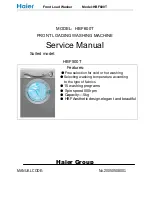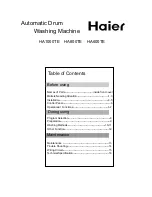
3- ENG
A12335
• Materials placed against or near the
pressure washer can interfere with its proper
ventilation features causing overheating and
possible ignition of the materials.
• Never operate pressure washer in an area
containing dry brush or weeds.
• Muffler exhaust heat can damage painted
surfaces, melt any material sensitive to
heat (such as siding, plastic, rubber, or
vinyl), and damage live plants.
• Always keep pressure washer a minimum of
four feet away from surfaces (such as houses,
automobiles, or live plants) that could be
damaged from muffler exhaust heat.
• Improperly stored fuel could lead to
accidental ignition. Fuel improperly
secured could get into the hands of
children or other unqualified persons.
• Store fuel in an OSHA approved container,
in a secure location away from work area.
• Use of acids, toxic or corrosive chemicals,
poisons, insecticides, or any kind of
flammable solvent with this product could
result in serious injury or death.
• Do not spray flammable liquids.
• Breathing exhaust fumes will cause
serious injury or death! Engine exhaust
contains carbon monoxide, an odorless
and deadly gas.
• Operate pressure washer in a well
ventilated area. Avoid enclosed areas such
as garages, basements, etc.
• Never operate unit in a location occupied
by humans or animals.
• Some cleaning fluids contain substances
which could cause injury to skin, eyes, or
lungs.
• Use only cleaning fluids specifically recom-
mended for high pressure washers. Follow
manufacturers recommendations. Do not
use chlorine bleach or any other corrosive
compound.
RISK TO BREATHING
WHAT
CAN
HAPPEN
HOW
TO
PREVENT
IT
RISK OF EXPLOSION OR FIRE (continued)
HAZARD
WHAT
CAN
HAPPEN
HOW
TO
PREVENT
IT
HAZARD
• Do not use acids, gasoline, kerosene,
or any other flammable materials in this
product. Use only household detergents,
cleaners and degreasers recommended
for use in pressure washers.
• Wear protective clothing to protect eyes
and skin from contact with sprayed
materials.
• Use of acids, toxic or corrosive chemicals,
poisons, insecticides, or any kind of
flammable solvent with this product could
result in serious injury or death.
RISK OF CHEMICAL BURN
HAZARD
WHAT
CAN
HAPPEN
HOW
TO
PREVENT
IT
• Over inflation of tires could result in
serious injury and property damage.
• Use a tire pressure gauge to check the tires
pressure before each use and while inflating
tires; see the tire sidewall for the correct tire
pressure.
NOTE:
Air tanks, compressors, and
similar equipment used to inflate tires can fill
small tires similar to these very rapidly. Add
air in small increments and frequently use the
tire gauge to prevent over inflation.


































